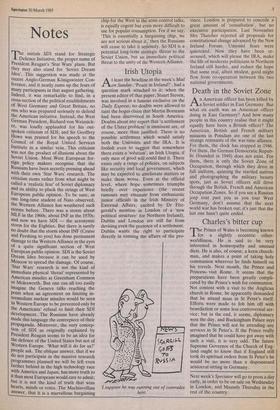Notes
The initials SDI stand for Strategic Defence Initiative, the proper name of President Reagan's 'Star Wars' plans. But they may also stand for 'Soviet Dream Idea'. This suggestion was made at the recent Anglo-German Konigswinter Con- ference, and it neatly sums up the fears of many participants in that august gathering. Indeed, it was remarkable to find, in a cross-section of the political establishments of West Germany and Great Britain, no one who was prepared seriously to defend the American initiative. Instead, the West German President, Richard von Weizsack- er, was loudly applauded for his out- spoken criticism of SDI; and Sir Geoffrey Howe was praised for his speech to the Council of the Royal United Services Institute in a similar vein. This criticism was not the product of illusions about the Soviet Union. Most West European for- eign policy makers recognise that the Russians have been secretly pressing ahead With their own 'Star Wars' research. The criticism stems rather from what might be called a 'realistic fear' of Soviet diplomacy and its ability to pluck the strings of West European public opinion. To be sure, as one long-time student of Nato observed, the Western Alliance has weathered such storms before. There was a storm about MLF in the 1960s; about INF in the 1970s; and now we have SDI — the acronymic storm for the Eighties. But there is surely no doubt that the storm about INF (Cruise and Pershing to you) has done permanent damage to the Western Alliance in the eyes of a quite significant section of West European public opinion. SDI is the Soviet Dream Idea because it can be used by Moscow to spread the damage. Of course, • 'Star Wars' research is not the kind of Immediate physical 'threat' represented by American missiles at Greenham Common or Molesworth. But one can all too easily Imagine the Geneva talks reaching the point when an agreement on limiting in- termediate nuclear missiles would be seen In Western Europe to be prevented only by the Americans' refusal to limit their SDI development. The Russians have already made this language the centrepiece of their propaganda. Moreover, the very concep- tion of SDI as originally explained by President Reagan seems to be an idea for the defence of the United States but not of Western Europe. 'What will it do for us?' People ask. The oblique answer, that if we do not participate in the massive research programmes planned we will be left even farther behind in the high technology race With America and Japan, has more truth to it than most Europeans would care to admit; but it is not the kind of truth that wins hearts, minds or votes. The Machiavellian answer, that it is a marvellous bargaining chip for the West in the arms control talks, is equally cogent but even more difficult to use for popular consumption. For if we say, 'This is essentially a bargaining chip, we are not serious about it,' then the Russians will cease to take it seriously. So SDI is a potential long-term strategic threat to the Soviet Union, but an immediate political threat to the unity of the Western Alliance.














































 Previous page
Previous page